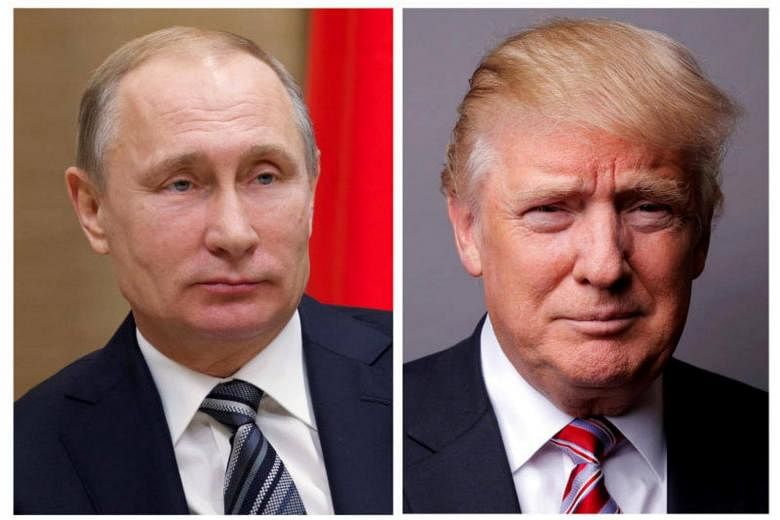LONDON - Russian officials have expressed hopes that Friday's (July 7) meeting between President Vladimir Putin and United States President Donald Trump will produce a framework for handling an expanding list of disputes between the two powers.
"We expect a working dialogue to be established that is probably vital for the entire world in terms of increasing the effectiveness of solving the critical amount of conflicts and problems that are growing every day," said Mr Dmitry Peskov, Russia's presidential spokesman.
But the White House in Washington remains tight-lipped about expectations from the meeting, which will take place on the margins of the G-20 summit of top world economies in the northern German city of Hamburg. And US diplomats appear to worry more about how Mr Trump will come across during the talks, rather than about the substance of the discussions between two leaders, the first of its kind for the Trump presidency.
Improving relations with Russia by holding an early summit with Mr Putin was one of Mr Trump's most significant pledges during last year's presidential campaign and officials close to Mr Trump initially sought to arrange a meeting before the US leader was sworn into office.
That the first US-Russian encounter of the Trump presidency ended up requiring more than half a year of planning and only comes after Mr Trump has met the leaders of at least another 50 countries is a vivid indication of how politically toxic relations between Washington and Moscow really are. Two formal US legal inquiries into allegations that Russia interfered in the US electoral process are now proceeding, and officials close to Mr Trump are under investigation for supposedly improper dealings with Russian government agents.
Mr Trump dismisses allegations of collusion between him and Russia as the narrative of "bad losers" who cannot come to terms with the reality of his electoral victory. Nevertheless, the White House was clearly worried about how Friday's summit with Mr Putin will be portrayed in US domestic media, so it has arranged for the President to visit neighbouring Poland before meeting Mr Putin; the hope is that the sight of the US leader surrounded by the heads of states and governments of all the central and eastern European nations which used to be ruled by the Soviet Union will address fears that the US President might be tempted to discuss the future of European security with Russia without consulting Europe's governments.
And the reality is that Russia and the US have a great deal of other critical strategic problems to discuss. The US President wants to test his assumption that Russia could help in the fight against international terrorism and, in return, Trump officials have hinted that Washington would be prepared to acknowledge Russia's pre-eminent influence in Syria and growing role in the Middle East.
The Americans also want Russian assistance in handling the nuclear crisis in North Korea. And, peering into the future, there is also the possibility of broader arms control negotiations, as well as the opportunity of adopting military confidence-building measures in Europe to avoid accidental clashes, just as Russia is gearing up for its biggest military exercise in decades, scheduled to start two months from now.
There are also more immediate diplomatic 'quick-wins' which can be pursued during Friday's meeting. The Russians have responded relatively mildly to the expulsion of 35 of their diplomats from the US during the last days of the Obama administration. But Russia is getting impatient with the continued restrictions the US is placing on the use of two Russian-owned diplomatic compounds in the US, and Moscow expects these restrictions to be lifted.
There is also the question of further economic sanctions the US Congress wants to impose on Russia; President Putin will be looking for some reassurance that the Trump administration will veto such Congressional measures.
As they go into Friday's summit, the assumption is that Mr Putin has the upper hand; unlike Mr Trump, he has almost two decades of experience in high-level diplomacy, and is invariably well-briefed for summits. By contrast, Mr Trump has a tendency of being absent-minded on such occasions, and even his closest aides have no idea how the personal chemistry between the two presidents will work out.
Still, Mr Putin also faces some dangers. For although he is much more focused than Mr Trump, he must know that should the summit end with the perception that the American leader emerged as the loser, US-Russia relations will be doomed for years to come.
In many respects, therefore, Friday's summit is largely about establishing the right mood between two leaders, both of whom have to rein in their macho images and constrain their winner-take-all instincts.


